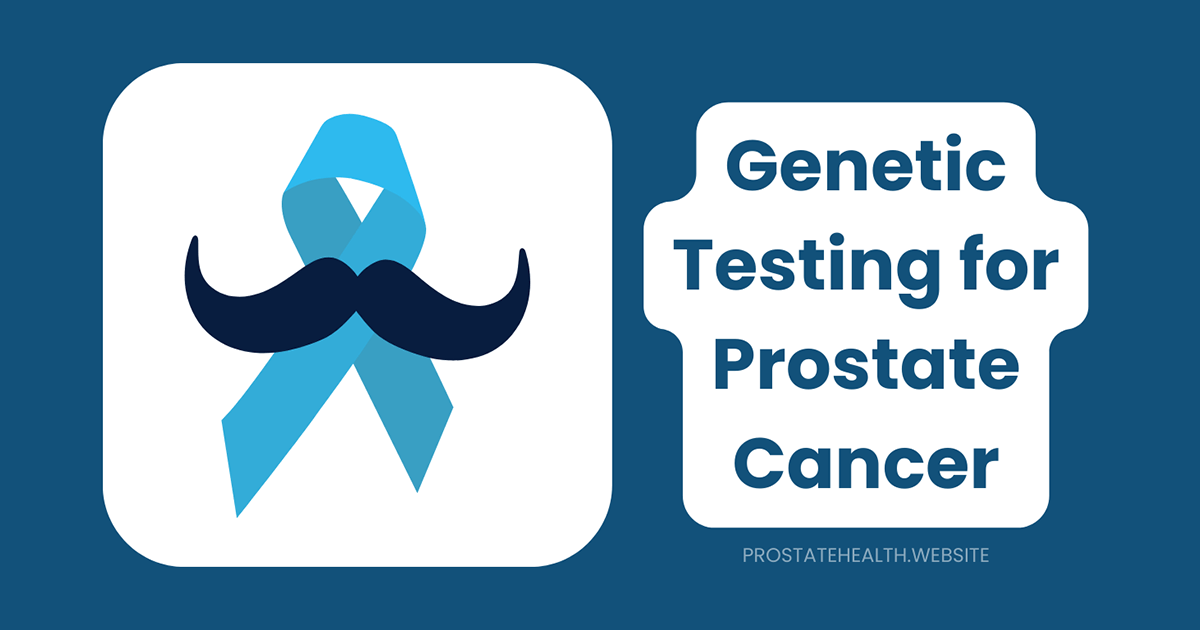Genetic Testing for Prostate Cancer: Who Should Consider It

When John, a 52-year-old construction manager, discovered his father had prostate cancer, his first thought wasn’t about genetics. But after his doctor mentioned genetic testing, John found himself navigating unfamiliar territory. “I never thought my family history would matter so much,” he told me during a recent conversation.
John’s experience isn’t unique. With prostate cancer affecting approximately 1 in 8 men during their lifetime and an estimated 313,780 new cases expected in 2025 alone, understanding your genetic risk has never been more important.
But who really needs genetic testing for prostate cancer? And what might the results mean for you and your family? Let’s dive into this increasingly important aspect of prostate health.
What Is Genetic Testing for Prostate Cancer?
Genetic testing examines your DNA for specific mutations or changes that may increase your risk of developing prostate cancer or affect how your cancer might behave if you already have it.
Unlike the PSA blood test or digital rectal exam that look for signs of existing cancer, genetic testing identifies inherited risk factors that you may have carried since birth.
These tests typically look for mutations in several key genes, including:
- BRCA1 and BRCA2: Often associated with breast and ovarian cancer, these mutations also significantly increase prostate cancer risk
- ATM: Mutations can double a man’s lifetime risk of prostate cancer
- CHEK2: Associated with a moderate increase in prostate cancer risk
- HOXB13: A rare but significant mutation that increases prostate cancer risk
- Lynch syndrome genes (MLH1, MSH2, MSH6, PMS2): Better known for colorectal cancer risk but also linked to prostate cancer
The Growing Importance of Genetic Testing
Recent advances in prostate cancer treatment have made genetic testing more relevant than ever. For instance, PARP inhibitors – a class of targeted therapy drugs – work particularly well in men with certain genetic mutations like BRCA1/2.
Dr. Sarah Johnson, oncologist at Memorial Cancer Center, explains: “We’re moving away from one-size-fits-all treatments. Genetic information helps us personalize therapy, potentially improving outcomes while reducing unnecessary side effects.”
Despite these benefits, a recent study found that 81% of patients with advanced prostate cancer did not receive genetic testing at diagnosis, highlighting a significant gap in clinical practice.
Who Should Consider Genetic Testing for Prostate Cancer?
Not everyone needs genetic testing for prostate cancer. Current guidelines suggest the following groups should consider it:
1. Men Already Diagnosed with Prostate Cancer
You should consider genetic testing if you have:
- Metastatic prostate cancer (cancer that has spread beyond the prostate)
- High-risk or very high-risk prostate cancer based on Gleason score, PSA level, or staging
- Prostate cancer diagnosed at age 55 or younger
- Prostate cancer with intraductal/cribriform histology (specific patterns seen under the microscope)
- A personal history of other cancers, especially breast cancer
Dr. Michael Chen, urologic oncologist, notes: “For men with advanced disease, genetic testing isn’t just about understanding risk—it’s about opening doors to targeted treatments that might not otherwise be considered.”
2. Men Without Prostate Cancer but with Risk Factors
You might benefit from genetic testing if you have:
- A first-degree relative (father, brother, son) diagnosed with prostate cancer before age 65
- Multiple family members with prostate cancer on the same side of the family
- A family history of breast, ovarian, pancreatic, or colorectal cancers, especially if diagnosed at young ages
- A known genetic mutation in your family related to cancer risk
- Ashkenazi Jewish ancestry, which carries a higher risk of BRCA mutations
According to the National Comprehensive Cancer Network (NCCN), men with BRCA2 mutations should begin prostate cancer screening at age 40, rather than the typical recommendation of 45-50.
The Genetic Testing Process: What to Expect
If you’re considering genetic testing, here’s what the process typically involves:
1. Genetic Counseling (Before Testing)
A genetic counselor will:
- Review your personal and family medical history
- Assess your risk factors
- Explain the benefits, limitations, and potential implications of testing
- Discuss possible results and what they might mean for you and your family
2. The Test Itself
Testing usually involves:
- A blood or saliva sample
- Analysis in a specialized laboratory
- Testing for multiple genes simultaneously (panel testing)
- Results typically available in 2-3 weeks
3. Post-Test Counseling
After receiving results, you’ll discuss:
- What the findings mean for your health
- Recommended screening or prevention strategies
- Implications for family members
- Emotional and psychological aspects of the results
Understanding Your Results
Genetic test results generally fall into three categories:
Positive Result
A positive result means a genetic mutation was found that increases your risk of developing prostate cancer or could influence treatment decisions if you already have it.
If you don’t have prostate cancer yet, this might mean:
- Starting screening at an earlier age
- More frequent screening
- Considering preventive measures
If you already have prostate cancer, a positive result might:
- Make you eligible for specific treatments like PARP inhibitors
- Influence decisions about surgery, radiation, or other therapies
- Suggest the need for monitoring for other cancers
Negative Result
A negative result means no known cancer-causing mutations were found in the genes tested. However, this doesn’t eliminate your risk of developing prostate cancer, as:
- Other genetic factors not included in the test might be present
- Environmental factors and lifestyle still play important roles
- Family history remains relevant even without identified mutations
Variant of Uncertain Significance (VUS)
Sometimes testing identifies a genetic change, but medical experts aren’t sure if it increases cancer risk. This is called a variant of uncertain significance.
Dr. Lisa Wong, genetic counselor, explains: “A VUS result can be frustrating because it doesn’t provide clear answers. However, as our knowledge grows, many variants are eventually reclassified as either benign or disease-causing.”
Benefits and Limitations of Genetic Testing
Benefits
- Personalized risk assessment: Better understanding of your individual risk
- Targeted treatment options: Potential access to therapies that work best for your specific genetic profile
- Family implications: Information that could help relatives make informed health decisions
- Proactive management: Opportunity for enhanced screening or preventive measures
Limitations
- Psychological impact: Potential anxiety or stress from learning about genetic risk
- Insurance concerns: Possible implications for life or disability insurance (though health insurance is protected by law)
- Incomplete information: Testing doesn’t capture all possible genetic factors
- Evolving science: Our understanding of genetic risk continues to develop
Making the Decision: Is Genetic Testing Right for You?
Deciding whether to pursue genetic testing is personal. Consider:
- How will you use the information? Will it change your medical decisions or screening approach?
- Are you prepared for the results? Consider the emotional impact of learning about genetic risk.
- What about your family? Results may have implications for blood relatives.
- Cost considerations: While insurance often covers testing for those who meet criteria, check your coverage.
Real Patient Perspective
James, 62, discovered he carried a BRCA2 mutation after being diagnosed with aggressive prostate cancer.
“Finding out I had this mutation was initially scary, but it changed everything,” he shares. “My oncologist immediately suggested a PARP inhibitor that’s been keeping my cancer under control for over a year now. Plus, my brother and son got tested too—my son was negative, but my brother carries the same mutation and now gets regular screening.”
The Future of Genetic Testing in Prostate Cancer
The field of genetic testing for prostate cancer continues to evolve rapidly. Emerging trends include:
- Expanded gene panels: Testing for more genes to capture additional risk factors
- Liquid biopsies: Less invasive testing methods using blood samples
- Polygenic risk scores: Combining multiple genetic markers to better assess overall risk
- Integration with artificial intelligence: Improving interpretation of complex genetic data
Conclusion
Genetic testing for prostate cancer isn’t for everyone, but for men with specific risk factors or existing prostate cancer, it can provide valuable information that influences prevention, screening, and treatment decisions.
If you think you might benefit from genetic testing, start by discussing your personal and family history with your healthcare provider. They can help determine if testing is appropriate and refer you to a genetic counselor who specializes in cancer risk assessment.
Remember John from the beginning of our article? After genetic counseling, he decided to proceed with testing and discovered he carried a BRCA2 mutation. “Knowledge is power,” he says. “Now my doctor and I have a plan—more frequent screening and lifestyle changes. And my brothers are getting tested too.”
In the evolving landscape of prostate cancer care, genetic information is becoming an increasingly important tool—one that could make a significant difference in outcomes for men at risk.






